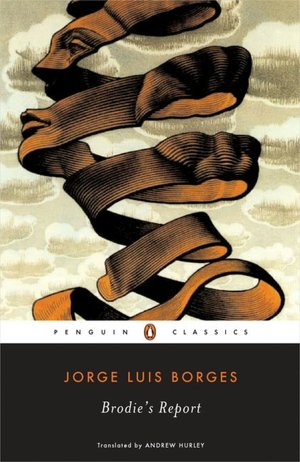TITLE: Brodie's Report
AUTHOR: Jorge Luis Borges
READ: December-January
THOUGHT: Wrote about this right after I finished it, when I was feeling inspired:
"After Fictions and The Aleph, this might be my favorite Borges collection. I actually may like it more than The Aleph. In terms of style, Borges is really straightforward and literal here. There are still a lot of the Borgesian turns of phrases, 'fake prologues', etc that are to be found in other Borges, but all of these stories lack any kind of baroque affect, faux-academic diction, etc. Not to say that those things are bad! They work very well when appropriate, like in his earlier stuff, but here I much prefer the plainer style.
I think the central aspect of Brodie's Report seems to be Borges' obsession with violence, which I think definitely seems comic given his status/mythology as a writer: someone much more concerned, in his day-to-day life at least, with libraries than with knife fights. There are a lot more of the latter than the former in this collection. What I find interesting is the way in which Borges deals with violence in these stories. There was one line in particular, I don't remember which story it was from or the line verbatim, but the scene went something like this: a young boy is visiting an estate somewhere with his cousin, and out of nowhere it appears as if there is going to be a knife fight among two of the guests at the estate. Everyone at the party obliges this request, and follows the two fighters outside, obeying the impulse. At this the narrator says something to the effect of, "we all felt ourselves being pulled into the whirl/void of the violence to come, both being fascinated and disgusted by it." -- not verbatim but you get it!
Borges, in many, if not all of these stories, is suggesting that violence is as inherent in the fabric of the universe as anything else that might be given cosmic significance, and despite its perennial role, has yet to be understood; it's impulses are nevertheless still obeyed. The fact that Borges articulates this in very simple stories, written simply, many of them dealing with knife fights, rivalries, even spiritual violence, is astounding. I think I have read in some places that people have written off later period Borges somewhat. I imagine that Borges' fascination with gauchos seems to be a bit "romantic," or at least something surprisingly contradictory given Borges' general bookish interests. I feel as if Borges is locating violence in temporality, a temporality associated with his national heritage, in order for the violence depicted to be granted a kind of timelessness -- the idea of violence as a timeless enigma/aspect is frequently alluded to in these stories. The gaucho can be replaced with cowboys, Nazis, Alexander the Great, or ancient cultures drinking the blood of virgins, whatever.
I also find it appropriate that someone like Borges is writing about gaucho knife fights: by being inherently removed from the kinds of tales that Borges is spinning (both in time and in terms of his 'personality') Borges is granted the ability to link the violence of the gauchos to a more universal violence, the violence that permeates everyday existence in a way that is continually baffling, despite its recurrence. I remember reading something that Edouard Leve said, I think maybe in the except of Autoportrait that I read, that despite his repeated exposure to it, acts of cruelty always retained an aura of 'unreality' to them -- that one has a hard time comprehending their existence as they are happening.
Not all of the stories are about gauchos, and those are also some of the best stories in this collection. "The Gospel According To St. Mark" might be one of my favorite Borges stories I have read. "The Elderly Lady", "The Duel", and "Guayaquil" are also stand-out stories to me, none of them directly pertaining to gaucho violence. I felt as if the title story was an alternate of "Tlon, Uqbar, Orbis Tertius" -- the creation of a world, I don't know
I really, really enjoyed reading this, one of Borges' best I think. Only three story collections to go and I am finished with the Borges (fiction) oeuvre! That makes me very sad.

No comments:
Post a Comment